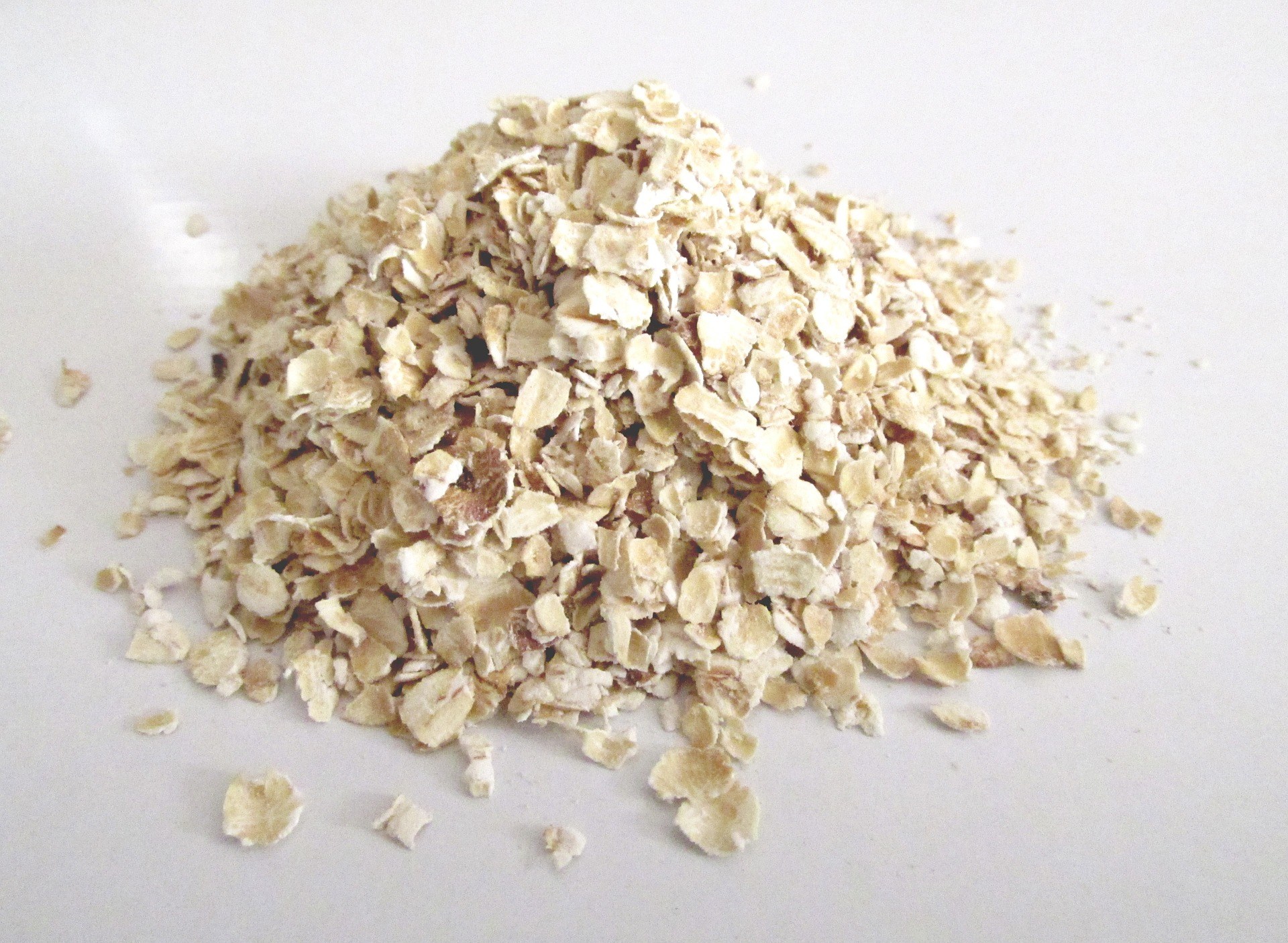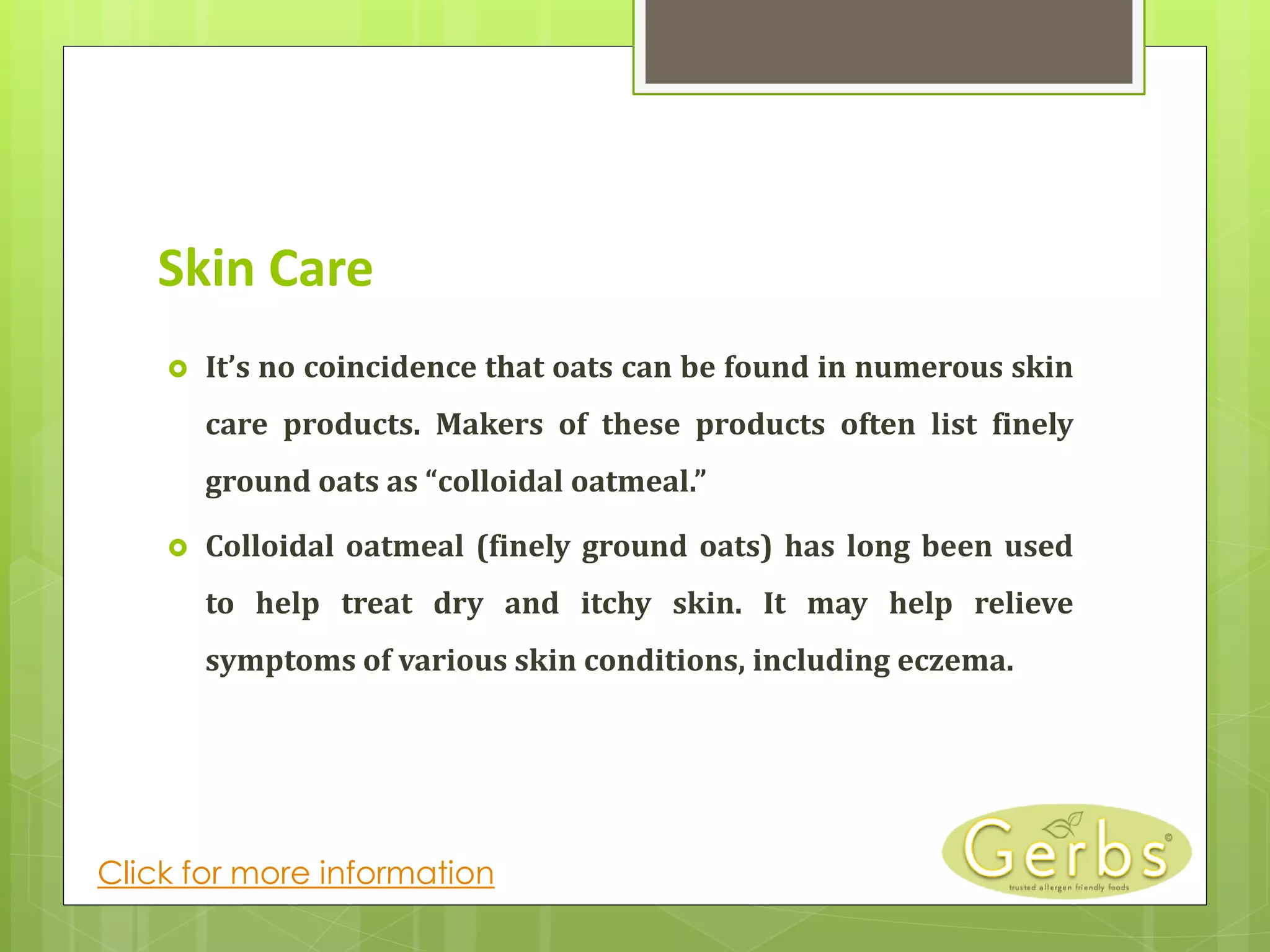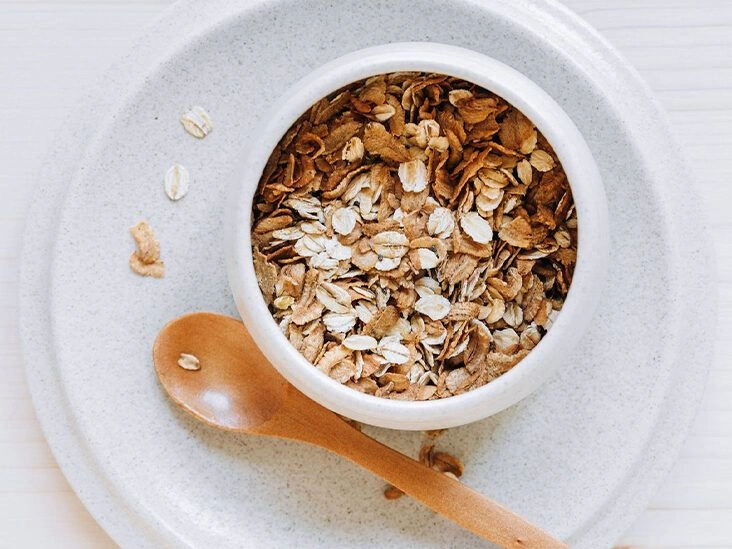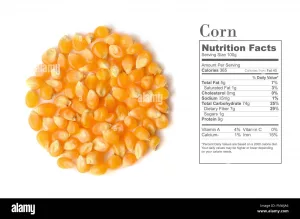Research indicates that oats and oatmeal offer numerous health advantages, such as aiding weight management, helping control blood sugar, and lowering the risk of cardiovascular disease.
Oats rank among the most nutritious grains available. They are a gluten-free whole grain and provide valuable vitamins, minerals, fiber, and antioxidant compounds.
Below are nine science-backed health benefits of consuming oats and oatmeal.
What are oats and oatmeal?
Oats are a whole-grain food, botanically known as Avena sativa.

The least processed form is oat groats, which require a long cooking time. Because of that, many prefer rolled, crushed, or steel-cut varieties.
Instant (quick) oats are the most processed option. They cook fastest but often have a softer, sometimes mushy, texture.
Oats are frequently eaten for breakfast as oatmeal, prepared by simmering oats in water or milk. Oatmeal is commonly called porridge.
They are also widely used in muffins, granola bars, cookies, and other baked treats.
1. Oats are highly nutritious
The nutrient profile of oats is well-rounded. They supply carbohydrates and fiber, including the soluble fiber beta-glucan.
Oats also provide quality protein with a favourable mix of essential amino acids.
They are rich in several vitamins, minerals, and antioxidant plant compounds.
Half a cup (40.5 g) of dry oats contains:
- Manganese: 63.9% of the daily value (DV)
- Phosphorus: 13.3% of the DV
- Magnesium: 13.3% of the DV
- Copper: 17.6% of the DV
- Iron: 9.4% of the DV
- Zinc: 13.4% of the DV
- Folate: 3.2% of the DV
- Vitamin B1 (thiamin): 15.5% of the DV
- Vitamin B5 (pantothenic acid): 9.1% of the DV
- Smaller amounts of calcium, potassium, vitamin B6 (pyridoxine), and vitamin B3 (niacin)
The nutrition facts for one cup of prepared oatmeal (made from 1/2 cup dry oats with water) include:
- 27.4 grams (g) of carbohydrates
- 5.3 g of protein
- 2.6 g of fat
- 4 g of fiber
- 153.5 calories
2. Whole oats are abundant in antioxidants
Whole oats are packed with antioxidants and beneficial plant compounds called polyphenols. A distinctive group of antioxidants known as avenanthramides is largely unique to oats.
Research has shown that avenanthramides may help reduce oxidative stress by boosting production of nitric oxide. This gas molecule helps dilate (widen) blood vessels, potentially improving blood flow. Additionally, avenanthramides possess anti-inflammatory and anti-itch properties.
There is some evidence that beta-glucan may also modestly influence blood pressure, though more research is required.
3. Oats contain a potent soluble fiber
Oats are high in beta-glucan, a form of soluble fiber. Beta-glucan partially dissolves in water and forms a viscous, gel-like substance in the gut.
The health effects of beta-glucan include:
- lowered blood glucose and insulin responses
- promotion of beneficial gut bacteria
- support for management of type 2 diabetes
4. Oats can reduce cholesterol
Cardiovascular disease is the leading cause of death worldwide, and elevated blood cholesterol is a major risk factor.
Multiple studies indicate that the beta-glucan fiber in oats effectively reduces total and LDL (bad) cholesterol.
Beta-glucan may stimulate the excretion of cholesterol-containing bile, lowering circulating cholesterol levels.
Oats may also help prevent oxidation of LDL cholesterol.
When LDL oxidizes after reacting with free radicals, it contributes to the progression of heart disease.
Oxidized LDL promotes inflammation in arteries, harms tissue, and increases the risk of heart attacks and strokes.
5. Oats can help control blood sugar
Type 2 diabetes is a common condition marked by elevated blood sugar, often due to reduced insulin sensitivity.
Oats may assist in lowering blood sugar levels, particularly in people with obesity or type 2 diabetes.
These benefits are largely due to beta-glucan forming a thick gel that slows stomach emptying and delays glucose absorption into the bloodstream.
Beta-glucan from oats and barley may also enhance insulin sensitivity.
A review of randomized clinical trials found that adding oat beta-glucan to carbohydrate-containing meals reduces postprandial insulin, though effects depend on the amount consumed.
6. Oatmeal is very satiating and may aid weight loss
Oatmeal (porridge) is not only a comforting breakfast but also very filling. Consuming filling foods can help you eat fewer calories and lose weight.
By slowing gastric emptying, the beta-glucan in oatmeal may boost feelings of fullness.
Beta-glucan may also stimulate the release of peptide YY (PYY), a gut hormone released after eating. This satiety hormone has been linked to reduced calorie intake and could lower obesity risk.
7. Finely milled oats may benefit skin care
It’s no surprise oats are featured in many skin-care formulations. Finely ground oats are often labeled as “colloidal oatmeal.”

The FDA recognized colloidal oatmeal as a skin-protective ingredient in 2003. Oats have a long history of use to soothe and calm irritated skin in various conditions.
For instance, oat-containing skin products may relieve uncomfortable symptoms of eczema.
Keep in mind these topical benefits apply to oats used on the skin, not necessarily those consumed in the diet.
8. Oats may lower the risk of childhood asthma
Asthma is the most common chronic respiratory condition in children.
It’s an inflammatory disorder of the airways — the passages that carry air to and from the lungs.
While symptoms vary, many children have recurrent coughing, wheezing, and shortness of breath.
Some evidence suggests that early introduction of oats into the diet may help protect children from developing asthma.
However, the extent to which oats can prevent asthma onset in children remains under discussion.
9. Oats may help ease constipation
Constipation — infrequent, difficult-to-pass bowel movements — affects people of all ages.
It is common, particularly among older adults, with studies indicating about 33 out of 100 adults aged 60 and over experiencing it.
Research suggests that oat bran, the fiber-dense outer layer of the grain, may help relieve constipation.
Oat bran has also been shown to reduce gastrointestinal symptoms and support digestion in people with ulcerative colitis (UC).
However, while soluble fiber from oats generally helps constipation, it appears less effective for opioid-induced constipation, since it does not reverse the slowed colonic motility caused by those drugs.
How to include oats in your diet
There are many ways to enjoy oats. The most common is to prepare oatmeal (porridge) for breakfast.
To make basic oatmeal, you need:
- 1/2 cup rolled oats
- 1 cup (250 ml) water or milk
- A pinch of salt
Combine the ingredients in a saucepan and bring to a boil. Lower the heat to a simmer and cook, stirring now and then, until the oats are tender.
To enhance flavor and nutrition, add cinnamon, fruit, nuts, seeds, peanut or almond butter, or Greek yogurt.
Oats are also common in baked goods, muesli, granola, and breads.
Though oats are naturally gluten-free, they can become contaminated with gluten during harvesting and processing because they may be handled on the same equipment as gluten-containing grains.
If you have celiac disease or non-celiac gluten sensitivity, choose oats certified as gluten-free.
Frequently asked questions
Is it healthy to eat oats every day?
One 2020 study found that people with inactive ulcerative colitis who consumed oat bran daily for 24 weeks maintained their health without worsening symptoms, suggesting daily oats can be acceptable.
Bear in mind that because oats are high in fiber, you might notice changes in stool form and bowel movement frequency.
What’s the difference between wheat and oats?
The nutrient contents of oats and wheat differ, but both provide carbohydrates, protein, vitamins, and minerals.
Both grains offer minerals like magnesium, zinc, and iron at comparable levels.
Oats are naturally gluten-free while wheat is not. Still, because of possible cross-contamination, look for a certified gluten-free label on oat products if you need to avoid gluten.
Are oats carbohydrates or protein?
Oats are a grain, which is primarily a carbohydrate source. That said, a 1/2 cup of dry oats also supplies a notable amount of protein.
Are oatmeal and oats the same thing?
Oats refer to the grain itself. Oatmeal is the porridge made from oats.
Are oats truly a superfood?
Oats are among the most nutrient-dense foods available and are often labeled a superfood. However, “superfood” has no official definition.
The bottom line
Oats are a nutrient-rich food packed with essential vitamins, minerals, and antioxidants. They offer more soluble fiber and protein than many other grains.
Oats contain distinctive elements like beta-glucan and avenanthramides.
Health benefits include improved blood sugar and cholesterol control, protection against skin irritation, and relief from constipation.
Additionally, oats are very satisfying, versatile, and possess qualities that may support weight loss.
Overall, oats are among the most nutrient-dense choices you can include in your diet.
More about oats:
- Are Oats and Oatmeal Gluten-Free? The Surprising Truth
- Oats 101: Nutrition Facts and Health Benefits
























Leave a Reply
You must be logged in to post a comment.